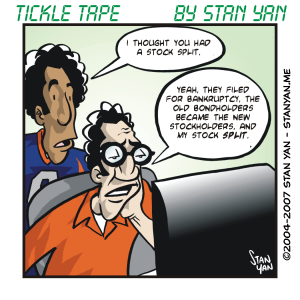Jake has just made three losing trades in a row? He decides he is in a slump and is now worried that he can’t get out of it. But is he really in a slump? Perhaps he’s just panicking for no good reason. He may just have a pessimistic attitude, but this might be enough to keep him stuck. Thoughts are powerful. The reality of the situation may not matter. All that matters, in the end, is your perception. How you look at a situation can dictate how you will react.
Simon is a seasoned trader. Like Jake, he has made three losing trades in a row. But is Simon worried? No. He just takes the setback in stride. He doesn’t even flinch. He figures something has gone wrong, and instinctively searches for a quick correction. He actively studies the markets. He examines the market conditions and notices that the markets are more erratic than usual. He moves to a different sector and finds some stability. He decides to apply his same strategy in that sector, and it works.
Rather than panic, like Jake, Simon took an active, problem-solving approach. He didn’t over-interpret the significance of the setback. He viewed the three consecutive losses as merely a symptom of a change in market conditions. He kept his focus on the external factors that may underlie the market action he observed. He didn’t make it internal. He didn’t blame himself for making a few losing trades. Rather than stew in self-doubt, he took decisive action and moved forward.
Your attitude and perceptions powerfully influence how you react to events, such as a series of losing trades. Jake focused on internal, personal reasons for the setback. He decided to explain the setback as reflecting his inadequacy as a trader. Simon took the opposite approach. He didn’t look inward at all. Instead, he looked outward. He looked at the market action and took an active, problem-solving approach to recover from the setback. Why did Jake look inward? Out of inexperience, he reasonably focused on his lack of trading ability. Perhaps, he made a few losing trades because he lacked the wealth of experience of a seasoned trader.
Although it’s a reasonable assumption, look at the consequences of jumping to the conclusion that he lacked the necessary skills to recover quickly. By assuming that he could not recover quickly, and thinking that he was limited in abilities, he took a passive course of action. He stopped looking for solutions and gave up too quickly. Had he just stayed focused on his ongoing experience, ignored his feelings of doubt, and continued to search for solutions, he might have found one, and moved forward rather than hitting a roadblock.
If you are a novice trader, it’s reasonable to question your abilities occasionally. Don’t forget about risk controls, and don’t trade beyond your skill level. But, on the other hand, don’t unnecessarily beat yourself up. When you get knocked down, it’s essential that you pick yourself up and start searching for new ways to master the markets. The only way you are going to hone your trading skills and become a seasoned trader is by making trade after trade across a variety of market conditions. When you enter a low point, it isn’t useful to mull over how you’re in a slump. Instead, you must stand up and take action. The more focused you can trade and the more actively you can respond, the more likely you’ll be one of the few who can rise above the masses and call themselves winning traders.


